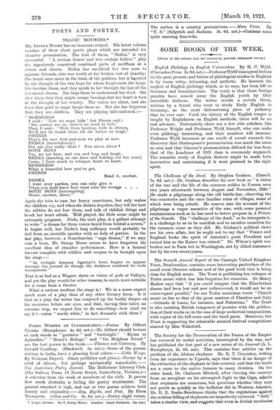POETS AND POETRY.
TRAGIC MOTHERS.*
MR. &URGE MOORE has an immense output. His latest volume consists of three short poetic plays which are intended for
chamber presentation. The first of them, " Medea," is very successful. " A curtain bearer and two curtain folders " play the ingeniously conceived combined parts of medihms at a séance and chorus. Medea has sacrificed her two sons to appease Artemis, who was wroth at her broken vow of chastity.
She hunts once more in the train of the goddess, but is haunted by the thought of the two boys for whose forgiveness she longs.
She invokes them, and they speak to her through the lips of the catranced chorus. She begs them to understand her deed. She slew them that they might escape bondage, but her heart is torn at the thought of her cruelty. The voices are silent, and she fears that grief or anger keeps them so. But she has forgotten that they are children. They are playing hide-and-seek :— " MERMEROS I said : ' Now we must hide ' but Pheres said :
She cannot see us, there's no need to hide.'
Then I said : Hide from hearing, hide in silence, We'll not be found there till she makes us laugh.'
PHERES That's the new hide-and-seek we play at now.
MEDEA [incredulously] But are you really there ? You move about ?
BOTH BOYS Yes, we are here, and run and leap and laugh.
MEDEA [kneeling on one knee and holding out her arms] Come, I have much to whisper, heart to heart.
MERMEROS What a beautiful bow you've got.
PHERES Bend it, mother.
MEDEA I want your pardon, you can only give it
When you shall know how cruel were the wrongs . .
BOTH BOYS [interrupting] Shoot, mother, shoot."
Again she tries to ease her heavy conscience, but only makes the children cry, and when she desists, hopeless, they tell her how the rabbits do not fear them, and talk of childish things and break her heart afresh. Well played, the little scene might be extremely poignant. Niobe, the next play, is a gallant attempt to write " a drama for three voices heard from behind a screen." It begins well, but Niobe's long soliloquy would probably be dull from an invisible speaker with no help of gesture. In the last play, however, a Scandinavian " saga drama," if we may coin a term, Mr. Sturge Moore seems to have forgotten his excellent idea of chamber performance. Here is a funeral barrow complete with wildfire and corpses to be brought upon the stage :- " As twilight deepens Agantyr's form begins to appear through the mound as though the darkness rendered its turfs transparent."
That is as bad as a Wagner dawn or vision of gods or Valkyrs, and yet the play would, for other reasons, be much more suitable for a room than a theatre.
What a curious medium the stage is ! We in a sense expect much more of a play than of any other literary form. Is it that in a play the writer has conjured up the bodily shapes of.
his creatures before our eyes, and that, having thus taken an extreme step, we expect him to do something—how shall we say it ?—extra " worth while," in fact dramatic with them ?


































 Previous page
Previous page